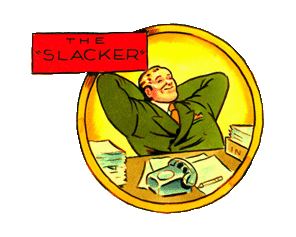
The Slacker
The slacker always looks like he’s overwhelmed with work, but it’s a carefully orchestrated act. In reality, he doesn’t pull his weight. But he has talent to burn. And that’s something he proves every time he actually completes a task.
On managing The Slacker
You call him in, tell him he’s got a lot of talent—and that’s the good news. Then you tell him the bad news is that his work habits need a lot of work. Lay out examples of what you consider the right level of dedication to the job. Give good examples—without naming names—of what others are doing with their timelines, productivity and turnaround times. This gives him an understanding of your expectations. Then compare his level of output to those good examples. If he is a new employee, maybe it’s just a matter of him not having a clear understanding of what’s expected of him. If he’s a long-time employee, I’m surprised that he’s still around, and I would be very blunt: “Look, you’re very talented, but you’re not pulling your weight.”




